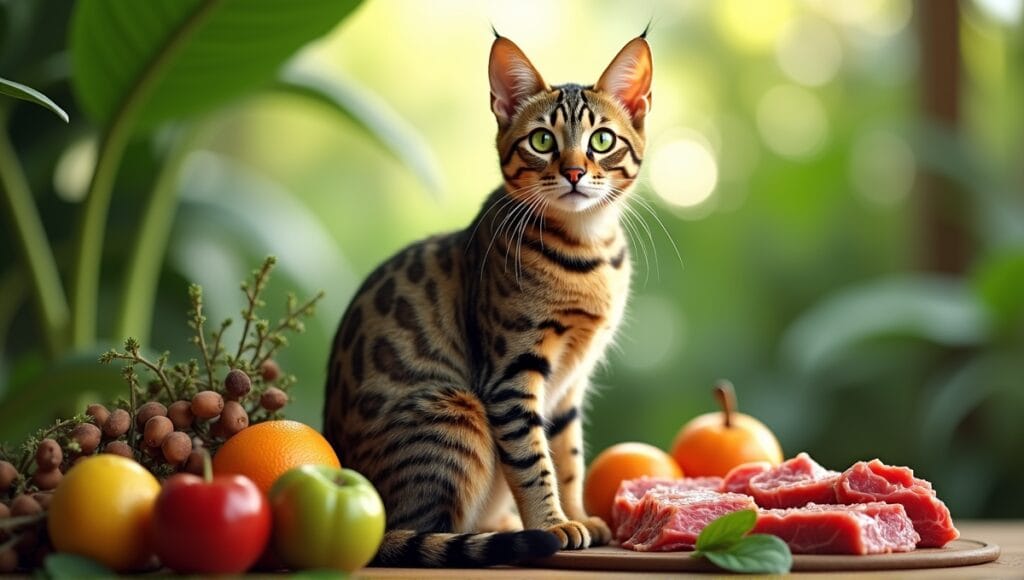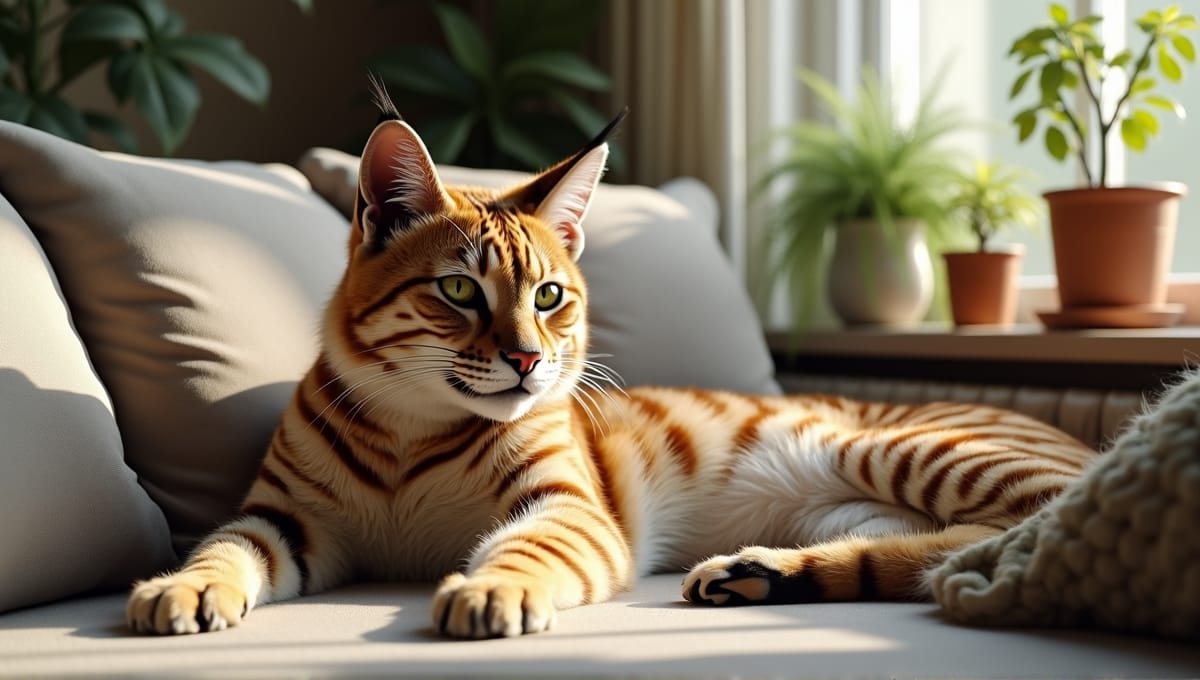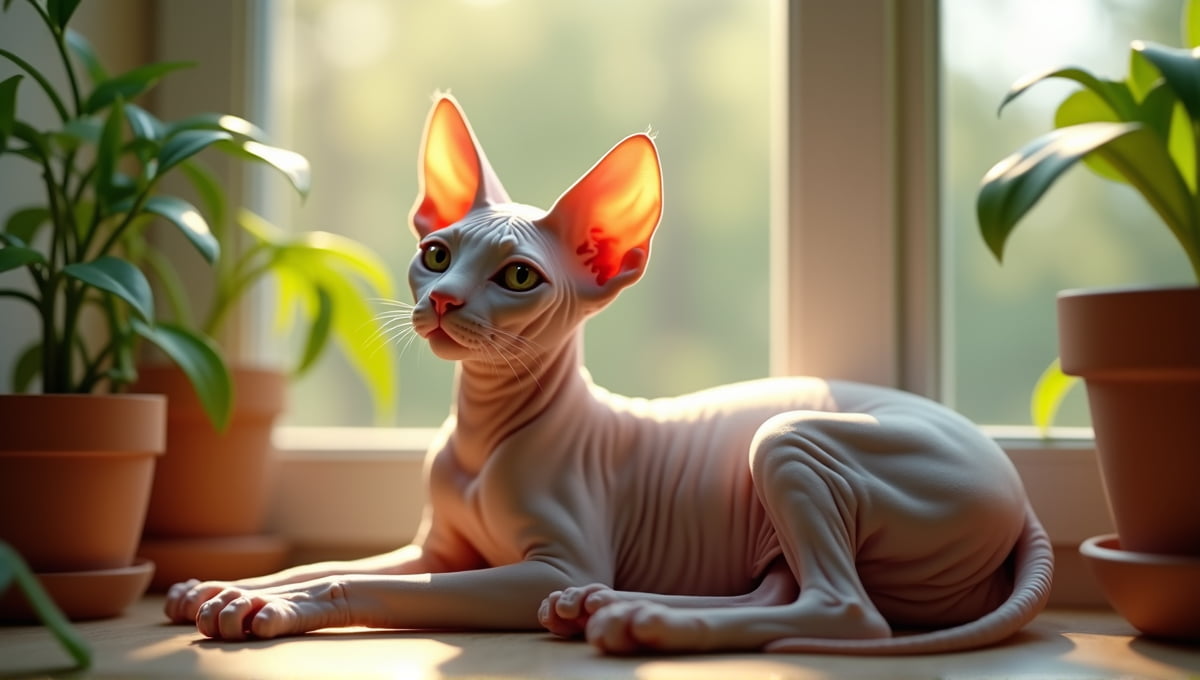Exotic cats are not your typical house cats, and their nutritional requirements are just as unique. As a feline nutrition expert of many years, I can tell you that feeding an exotic cat isn’t as simple as feeding them quality cat food. You need to understand what they truly need to eat from a nutritional standpoint to ensure they stay healthy and live their best life.
Understanding Exotic Cat Diet Requirements
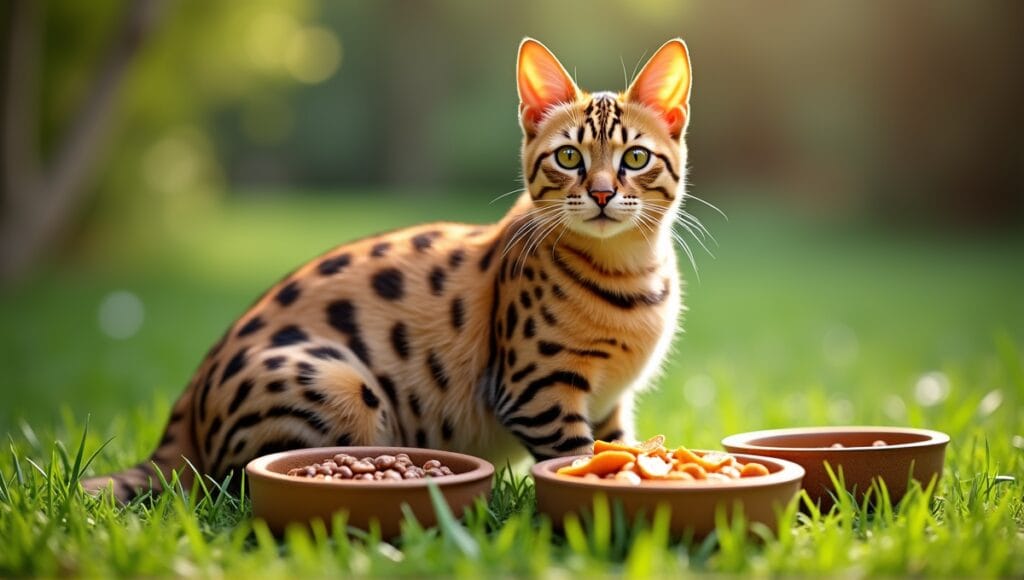
Exotic cat breeds have different nutritional needs from domestic cats. I’ve dedicated years to studying these beautiful creatures and what they need to eat to thrive. Exotic felids are obligate carnivores, meaning their diets should consist primarily of animal based proteins. In other words, their bodies are designed to get all of the nutrients they need from meat.
The best diet for exotic felids is 50-60% protein, 30-50% fat, and less than 10% carbs. This is the balance of macronutrients they would consume if left to their own devices. Many commercial pet foods do not meet those nutritional requirements, so don’t assume that a given pet food is sufficient for an exotic cat.
Exotic cats require a higher percentage of protein in their diet than domestic cats. Their bodies are set up to thrive when they receive plenty of animal protein. This is another reason the average domestic cat food won’t meet an exotic cat’s needs.
Proper nutrition is also a major factor in the health and longevity of an exotic cat. As you might expect, feeding a diet that doesn’t check all of these boxes can lead to a variety of health problems. I’ve personally observed what the right diet can do for an exotic cat.
Protein Sources for Exotic Cat Diets
When it comes to feeding exotic cats, protein quality and variety are the most important factors. Protein quality for exotic cats includes:
- Whole prey animals (mice, rats, rabbits)
- Lean meats (beef, chicken, turkey)
- Organ meats (liver, heart, kidneys)
- Fish (in small quantities)
You should also feed a variety of protein sources to ensure your exotic cat receives a variety of nutrients. If you don’t, the cat won’t receive a wide range of nutrients.
A lack of nutrient variety will cause health problems for your cat. In the wild, these cats would eat different prey species, resulting in dietary nutrient variety.
Insufficient protein, I’ve seen, leads to muscle atrophy, weak immune systems, poor coat quality, and many other health problems in exotic cats. You don’t want your cat to suffer these issues.
Always remember that the primary macronutrient in an exotic cat’s diet is protein. Don’t compromise on protein. Your cat’s health depends on it.
Fat and Carbohydrate Requirements in Exotic Cat Diets
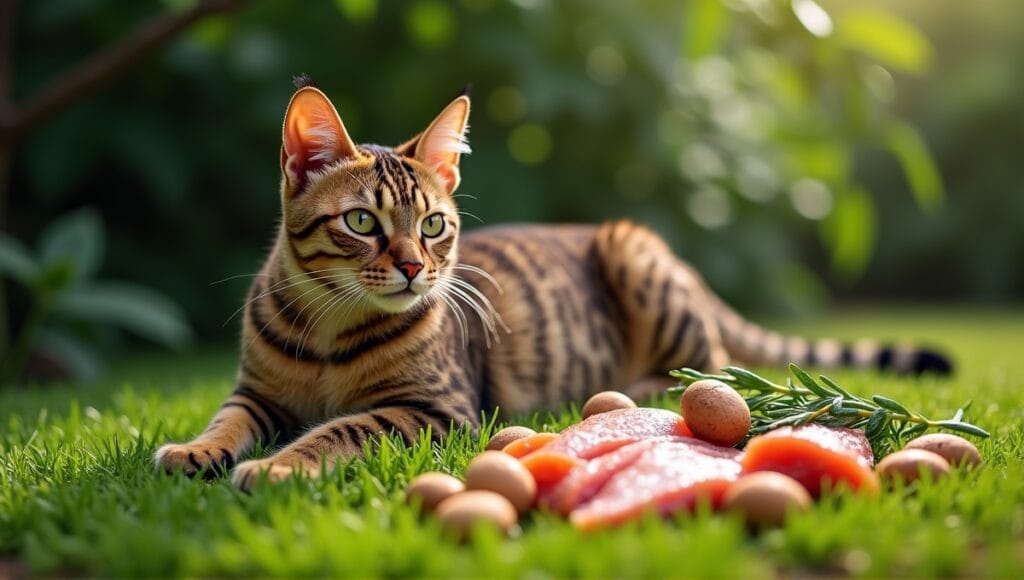
Fat is an essential component of an exotic cat’s diet. These cats require a high fat diet. Ideally, 30-50% of their diet should be fat. This may seem like a lot, and it is, but that’s what their bodies require.
Essential fatty acids, especially omega-3 and omega-6, are essential for exotic cats. These fatty acids help with skin and coat health, reduce inflammation, and support brain function. Ensuring your cat has enough of these fatty acids will also produce a significant improvement in the coat.
Carbohydrates, however, should be minimized in an exotic cat’s diet, as they have little need for carbohydrates, and their bodies don’t process them very well. When they consume too many carbohydrates, exotic cats often become obese and develop diabetes.
I’ve seen too many cats that were overweight and unhealthy because their owners incorrectly thought they needed a higher carbohydrate diet. So avoid this mistake by lowering the carbohydrate content.
Feeding Schedules and Portion Control for Exotic Cats
Feeding exotic cats isn’t just about what to feed, but also when and how much. Most exotic felids adults are fed once a day, which mimics their natural feeding schedule. Similarly, in the wild, these cats might consume one large meal at a time after a successful hunt.
The right portion size of food should be determined by your cat’s body weight and activity level. As a general rule, adult exotic cats need to eat about 2-4% of their body weight each day. However, this percentage can vary slightly by species and individual cats.
Consistency in your feeding schedule is paramount. Exotic cats do best with predictable routines. If you establish a regular schedule, your cat will be less stressed and more satisfied throughout the day.
Always monitor your cat’s weight and adjust the amount you feed accordingly. Unfortunately, overfeeding is a common issue I’ve seen in people who own exotic cats. Keep your cat at a healthy weight to avoid any obesity related health problems.
Commercial Exotic Cat Foods vs. Raw Diets
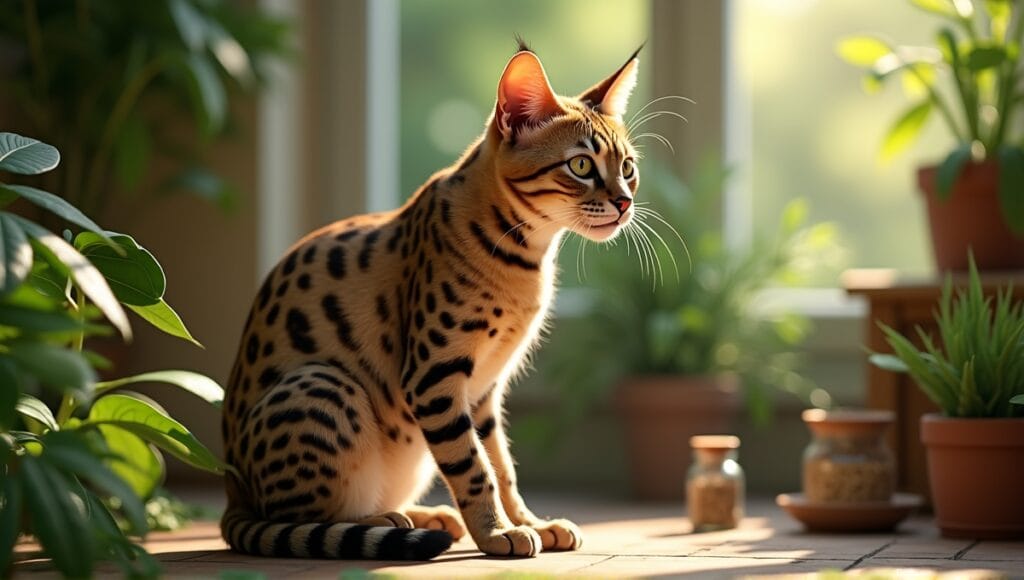
The debate over commercial food versus raw food for exotic cats is ongoing. Commercial foods designed specifically for exotic cats offer a convenient and balanced diet. They are convenient and formulated to meet specific nutritional goals. However, not all commercial foods are created equally. You should look at each commercial food’s label and select the highest quality options.
Raw food diets are a more natural option that closely resembles what exotic cats eat in the wild. They offer higher quality proteins and less processing. However, raw food diets require more planning to ensure the diet is nutritionally balanced. There is also a risk of bacterial contamination if the food isn’t handled properly.
If you’re thinking of switching from one diet to another, do so gradually. A rapid shift can cause digestive upset. I’ve seen many cases of owners changing type of diet too quickly, which upset their cat’s stomach.
Before changing your cat’s diet, speak with a veterinarian who has experience with exotic cat nutrition. They can help you select the best diet for your cat specifically.
Supplements and Additives in Exotic Cat Diets
Key essential vitamins and minerals are essential to the health of any exotic cat. These include taurine vitamin A vitamin D and calcium. A well-rounded diet should cover most of these micronutrients. However there are times when specific supplements are needed.
You may need to incorporate dietary supplements if the diet you currently feed your cat is lacking in certain key micronutrients. This is common with homemade or raw diets. Always ask a veterinarian for recommendations before introducing any supplements to your cat’s diet.
Note that over-supplementation can be just as harmful as under-supplementation. I’ve seen far too many cases of owners who have given cats too many supplements thinking it was beneficial only to cause serious health issues. You really need to be cautious and rely on expert advice regarding supplements.
Remember that the primary focus should be on feeding a nutritionally complete diet, and supplements should only be used when necessary.
Health Issues Related to Improper Exotic Cat Diets

Inadequate diets can cause serious health problems in exotic cats. I’ve seen many exotic cats with nutritional deficiencies throughout my career. The most common issues are anemia, weak bones, and a weak immune system. Any of these problems will significantly reduce your cat’s quality of life.
Obesity is another common issue I see in exotic cats. This is often the result of overfeeding or a diet too high in carbohydrates. Carrying around excess weight is very uncomfortable and it leads to a long list of health issues.
Dental disease is very prevalent in exotic cats who eat a poor diet. If they eat soft processed food, they don’t receive the dental benefits of chewing on whole prey. This leads to tartar on the teeth, gum disease, and eventually tooth loss.
The solution to all of these problems is feeding a species-appropriate diet. Additionally, make sure you take your cat to the vet regularly. If there are any nutritional imbalances, they can usually catch it early with a blood panel.
Monitoring and Adjusting Exotic Cat Diets
Regular health monitoring and diet adjustments are imperative for exotic felids kept as pets. You are the one responsible for your cat’s health and nutrition. Look for signs that your cat isn’t receiving adequate nutrition, such as changes in coat quality, energy levels, or body condition.
Schedule regular check-ups with a veterinarian familiar with exotic cats. They can run blood work and physically examine your cat to assess its nutritional health.
As your cat grows older or if its health status changes, you may need to change its diet. Additionally, activity level will impact a cat’s nutritional needs. An older, less active cat may require fewer calories, while a younger, more active cat may need more.
Be prepared to adjust your cat’s diet as it ages or based on its activity levels. Being flexible and paying close attention to details is essential to maintaining your cat’s health through nutrition.
Legal and Ethical Considerations of Exotic Cat Ownership
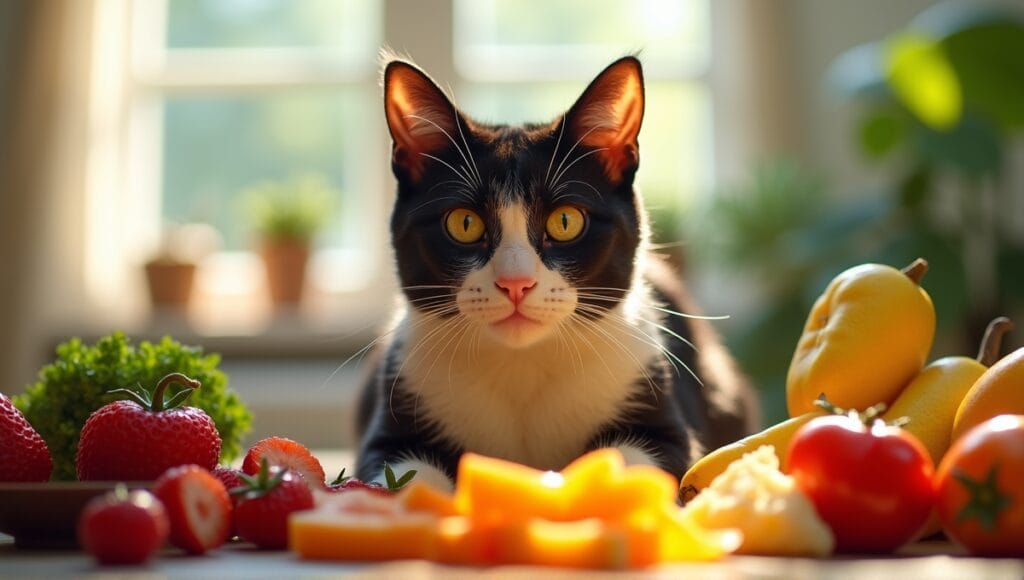
Owning an exotic cat is a major legal and ethical responsibility. The legalities of owning an exotic cat can vary significantly depending on where you live. You must understand and adhere to all of your applicable laws.
The ethical considerations of owning an exotic cat as a pet are a bit of a grey area. These animals have very specific needs that are often difficult to meet in a domestic setting. Proper nutrition is just one of your responsibilities as an exotic cat owner.
Ensuring your exotic cat has a diet that meets all of its nutritional needs is essential. It’s not just about keeping them alive, but ensuring they truly thrive. This requires a lot of time, research, and often money.
Ask yourself if you’re truly prepared for the responsibility of owning an exotic cat. Their diet is just one of many things to consider.
Expert Advice and Current Research on Exotic Cat Nutrition
Exotic animal nutrition specialists are constantly refining our knowledge of exotic cat nutritional requirements. Recent research has helped us better understand the nutritional needs of various exotic cat species.
Research is ongoing to further our knowledge of exotic felid nutrition. This research often involves studying wild diets, optimizing nutrient profiles, and solving health problems caused by captive diets.
As a pet owner, it’s important to keep up to date with the latest information about exotic cat nutrition. What we know today may change through further research tomorrow. Therefore, always be willing to adjust your cat’s diet to reflect the most recent scientific findings.
Keep in mind that each exotic cat is an individual. What one cat thrives on, another may not tolerate. Regular check-ins with exotic animal nutrition experts are critical to ensure your cat is on the best diet possible.
For those interested in learning more about specific exotic cat breeds, you might want to explore information about the Bengal cat, known for its wild appearance, or the Savannah cat breed, which is a hybrid between a domestic cat and a serval.
To Conclude
Exotic cats have unique nutritional requirements, so you must understand their specific dietary needs. A balanced diet of quality animal proteins, the right fats, and very few carbohydrates is essential. Regular health tracking and nutritional changes are essential. I’ve studied these amazing animals as a cat lover, and I’ve learned how important nutrition is to their health. However, responsible exotic cat ownership is about more than just their diet – it’s a comprehensive responsibility to their health.


